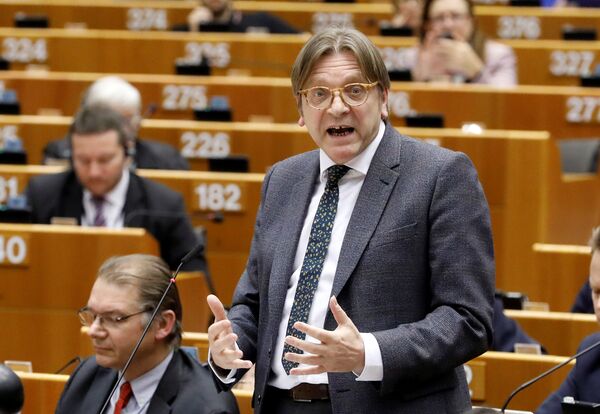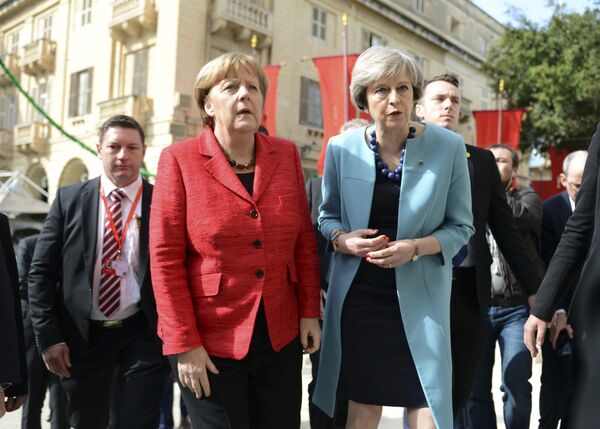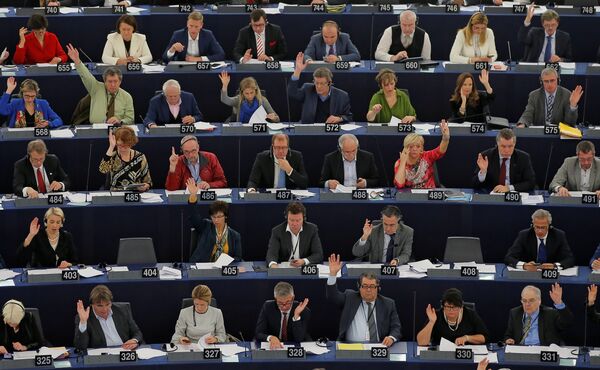Speaking at an SPD conference in Berlin December 7, party chief Martin Schulz outlined a number of proposals for European reform — including the creation of a United States of Europe by 2025, by way of a federal constitutional treaty.
"Such a constitutional treaty has to be written by a convention that includes civil society and the people. This treaty will then have to be put to the member states — those that don't approve it will automatically have to leave the EU," Schulz said.
Schulz' comments provoked little direct reaction from other European political figures, with Chancellor Angela Merkel merely saying the EU should focus on rectifying internal "weaknesses" and improving its "ability to act" when asked for comment. On the latter point, she called for greater bloc unity on defense and security policy.
I want a new constitutional treaty to establish the United States of Europe. A Europe that is no threat to its member states, but a beneficial addition.
— Martin Schulz (@MartinSchulz) December 7, 2017
Nonetheless, Alexander Dobrindt, a prominent Christian Social Union (CSU) legislator, slammed the leader's suggestions.
"Someone who wants to create the United States of Europe by 2025, who wants to dissolve nation states in the next seven years, who wants to throw anyone who doesn't submit to this dictate out of the EU…must be called a Europe radical," Dobrindt fulminated.
Common Theme
Despite the apparent aversion of many in Europe to a federalized bloc broadly mirroring the US' political structure, such a prospect has frequently been mooted by leading EU figures.
For instance, following the defeat of the European Constitution in referenda in France and the Netherlands, former Belgian prime minister Guy Verhofstadt released Verenigde Staten van Europa ("United States of Europe") in which he claimed European citizens crave more Europe, and a federalized Europe based on five common areas — socioeconomic policy, technology cooperation, justice and security, shared diplomacy and a European army.

Following the ratification of the Treaty of Lisbon (December 2009) by all member states of the EU, the outline of a common diplomatic service, known as the External Action Service of the European Union (EEAS), was set in place. On 20 February 2009, the European Parliament also voted in favor of the creation of Synchronized Armed Forces Europe (SAFE) as a first step towards a forming a true European military force.
In 2012, Viviane Reding, Luxembourg's Vice-President of the European Commission, called in a speech in Germany for the establishment of a United States of Europe as a way to strengthen the unity of Europe — sentiments echoed by Italian Prime Minister Matteo Renzi in 2014, who pledged to use Italy's six-month EU presidency push for its creation.
Brexit by the Gift Shop
Moreover, a United States of Europe could be tacitly facilitated, if not effectively created, by the secession of the UK from the EU.
The UK is the EU's third most populous member state, comprising 12.76 percent of the bloc's overall population, making it a highly influential player in the European Council and Parliament. The country's exit would almost inevitably strengthen Germany's position, while weakening the clout of smaller, more euroskeptic states — VoteWatch data shows the UK's main voting allies in the European Parliament are Sweden, Denmark and the Netherlands, while Germany almost never votes the same way.

Brexit would also alter Parliament's party landscape and ideological composition — over 60 percent of the UK's 73 MEPs currently sit with center-right and Eurokceptic groups, and while it's unclear whether the country's seats will be lost or reallocated, their disappearance one way or the other would allow progressive blocs to form majorities without the support of European People's Party.



